City Government
Meet the City Officials who Keep Peachtree Corners Humming
Published
3 years agoon
By
Mark Woolsey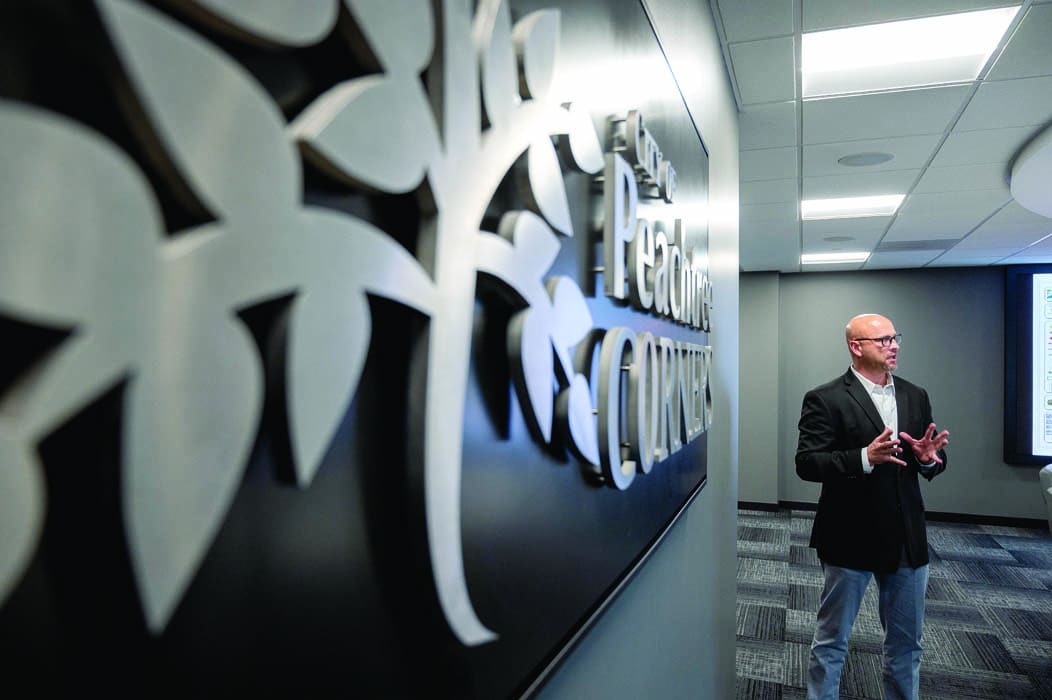
Photos by George Hunter.
Consider a high-performance vehicle — bright, shiny and powerful. It leaps ahead quickly when it needs to, but can also settle back to a comfortable cruising speed. It’s nimble, able to turn on a dime or smoothly reverse direction, if need be.
Ever wished for a vehicle like that? The good news is that if you live within the city limits of Peachtree Corners, you already have one.
Gwinnett County’s largest and newest city has a most efficient “vehicle” for governing its home turf — a staff helmed by experienced department heads who put their shoulders to the wheel, are adept at balancing the sometimes-clashing interests of residents, the business community and other constituencies and aren’t afraid to embrace unconventional approaches.
City Manager- Brian Johnson
“It’s a high-performing municipality within the council-manager form of government,” summarized City Manager Brian Johnson.
“When you look at everything from streets and drainage to business licenses to zoning to document storage to elections — across the gamut — when you add up all of those areas, they should be the sum of all the parts, and with each of those areas you have a senior member overseeing it,” he said.
Johnson’s job is not that of a direct service provider. He supports his departmental chiefs to help them get the resources they need, puts out brush fires, interfaces with the mayor and council and isolates subordinates from politics and distractions so they can get their jobs done in the most efficient manner possible.
He indicated that the city’s organizational chart is an effective display of its leaned-out approach. “A lot of cities have a finance director and also a budget director,” he noted. “We have one person who does both, and as a result he can do certain things in regard to organizations we’re dealing with; he can make decisions quicker because he has authority over multiple areas.”
That means that those decision-makers don’t slip a card into a time clock and punch out at 5:01. And there are those phone calls and emails that arrive outside of normal business hours. All part of the mosaic, and Johnson is proud of the team that has been painstakingly assembled.
Assistant City Manager- Brandon Branham
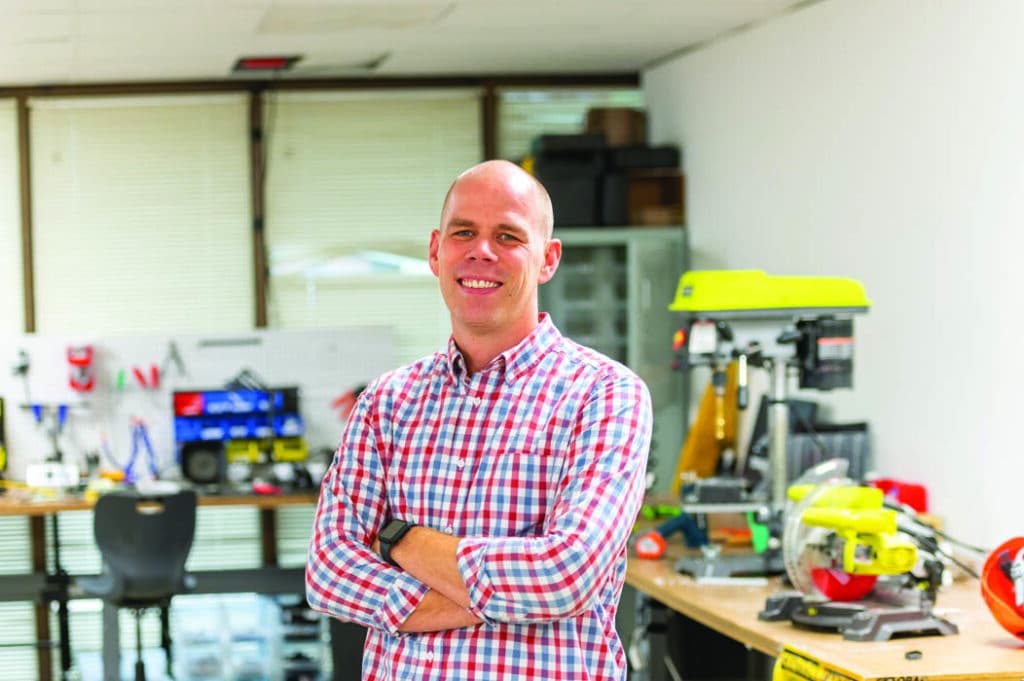
In a twist on an old saw, it can be said that behind every city manager stands a good assistant city manager. But Brandon Branham does more than support his boss in running the city. He wears an additional major hat — chief technology officer.
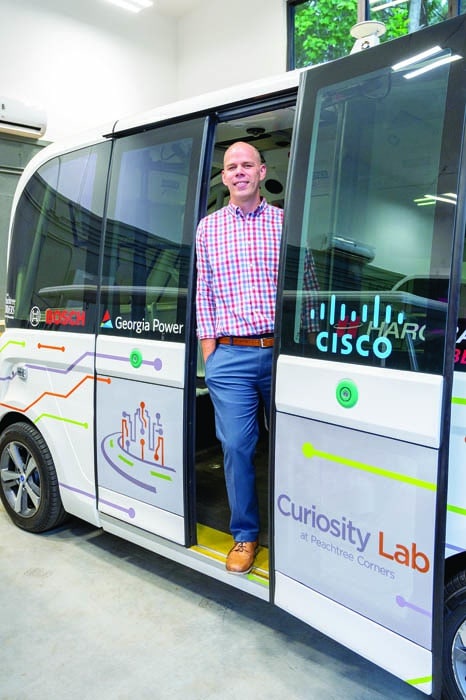
It’s not the most frequent combination of duties for a municipal official, but Branham seems to thrive on it. His responsibilities are broad spectrum. He compares his role to private business, in which Johnson, the city manager, would be chief executive officer and Branham would have chief operating officer stripes.
His operational responsibilities include imbuing departments with strategy and efficiency updates, handling economic development with an emphasis on recruitment, overseeing Innovative and Smart Cities programs, managing facilities and doing partner engagement and management with the Curiosity Lab. Whew!
“We also make sure we’re up to speed, pushing the envelope on the latest cutting-edge technology,” Branham added for good measure.
In that vein, his proudest moment as a tech chief was when the city achieved NIST-171 compliance for the Curiosity Lab Network. He said that’s the highest level of data security for unclassified data an organization can achieve.
“We have a pretty robust security network that blocks intrusions. We get attempts all the time,” he shared.
No one day is the same as another, he said, and that’s part of what jazzes him as he begins his day. One day he might be immersed in some technical aspect of Curiosity Lab, the next he could be helping with long-range financial projections and the day after THAT might find him out of the building taking a gander at a public works project.
All in a day’s work, to be sure.
And, yes, there are roadblocks on occasions, but Branham said an easy-going personality helps navigate and smooth out any rough spots.
He seems to relish startups; he assisted in the birth of nearby Sandy Springs as a contract employee for CH2MHill. He came over to Peachtree Corners in the same capacity before landing on the city payroll.
“What we’ve been able to accomplish in nine years in Peachtree Corners has been pretty impressive,” he said.
On a personal note, Branham said that living in The Corners and going out to dinner usually brings him attention, with folks wanting to ask him about some facet of the city and its government.
Community Development Director- Diana Wheeler
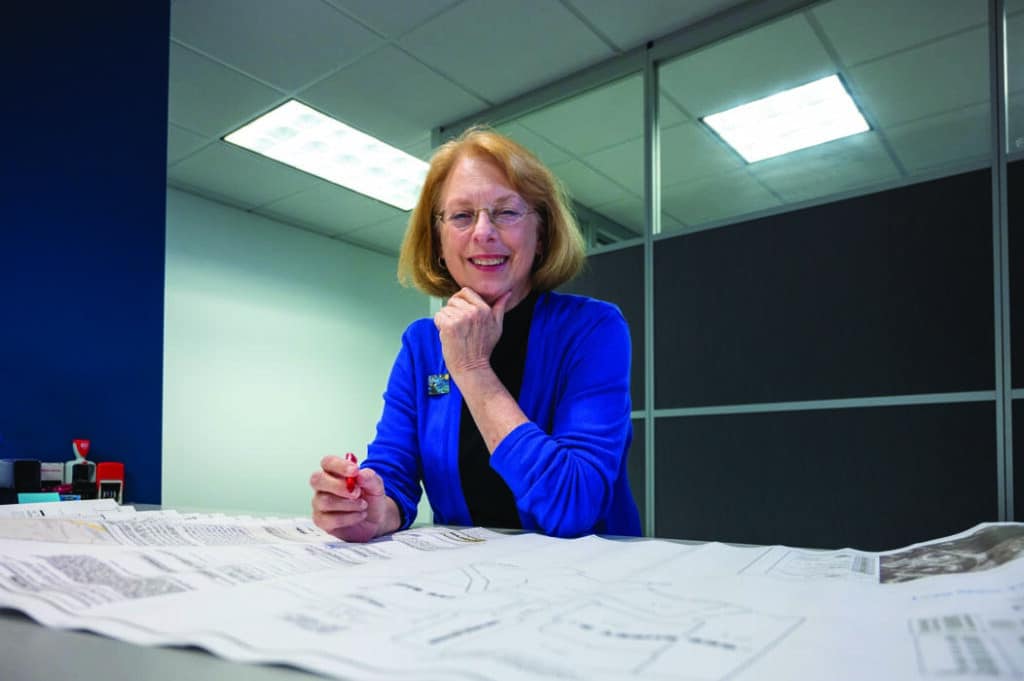
If you want to huddle with someone who knows the City of Peachtree Corners from the ground up, speak to Diana Wheeler, the community development director. She has the distinction of being the city’s first employee, even before the onboarding of a city manager.
Here’s what happened: Peachtree Corners commenced operations on July 1, 2012. Wheeler, who had been community development director for the City of Alpharetta for almost 19 years, departed that position at roughly the same time.
“Somebody read that I had left Alpharetta and I got a phone call and they asked me if I wanted to help with the start of a new city,” she said. “That was one of the few things I hadn’t actually done before.”
Fast forward to today and Wheeler is well settled into her role.
“I oversee community development,” she explained. “That’s all of the building, all of the planning , all of the code enforcement. So that’s most everything that comes out of the ground and is man-made, other than road and bridge-type public projects.”
Her job requires her to be well-versed in a plethora of different kinds of development: residential, commercial, industrial and institutional. Economic development is also on her watch, although she has a staffer who handles that area specifically.
It’s quite a smorgasbord of responsibilities. And it actually represents a widening of her original career goal.
“I started out to be an architect and I have a degree in architecture and urban design from Columbia,” Wheeler said. “I discovered that I really liked urban planning and designing spaces more than buildings. So then my focus evolved away from individual buildings, more into city planning.”
In pursuing that, she follows the script of the city’s 20-year comprehensive plan that was developed after extensive public input, visioning sessions and city council direction.
She noted that while the city is mainly built out, there are considerable opportunities for redevelopment. That’s led to incentive programs for developers, including one under which those putting together mixed-use developments can earn a way to make their projects more residentially dense in return for instituting value-added improvements from a list developed by the city.
That whole landscape has come with a number of challenges, including dealing with inherited rules and regulations from the days of Gwinnett County control. “What we are trying to do is enhance the quality of life by managing growth,” she asserted.
Focusing on both the larger picture and its component parts constitutes a major motivator in Wheeler’s job.
Take the Town Center concept, which emerged from community meetings and citizen input and became an integral — and literal — part of the landscape. The plan being a 20-year document, she pointed out, the project didn’t come together overnight but “we got to work implementing that vision and it took six years to make it happen, but it’s here now.”
The enthusiasm and passion Wheeler brings when talking about that and other projects is palpable. She’s not a fan of bureaucracy, but of results.
“I’m really fascinated by the projects and all the fun stuff that comes with them and I have had the opportunity to do a lot of that in Peachtree Corners,” she shared. She added that two factors played into that experience: one, the Corners status as a new city and the other, the City Council’s willingness to try new approaches.
When not wearing her development hats, Wheeler said she likes gardening, “and like a lot of people during our COVID break, I have refined my baking abilities.”
City Clerk- Kym Chereck

Kym Chereck was raised overseas by parents who worked government jobs. She has found a home in Peachtree Corners where she and her husband raised two children and where she serves as city clerk.
The clerk’s job is heavily bound to record-keeping, as the office keeps official and historical records of the city. It also provides support to the mayor and council, helps facilitate the city’s legislative process and supervises elections.
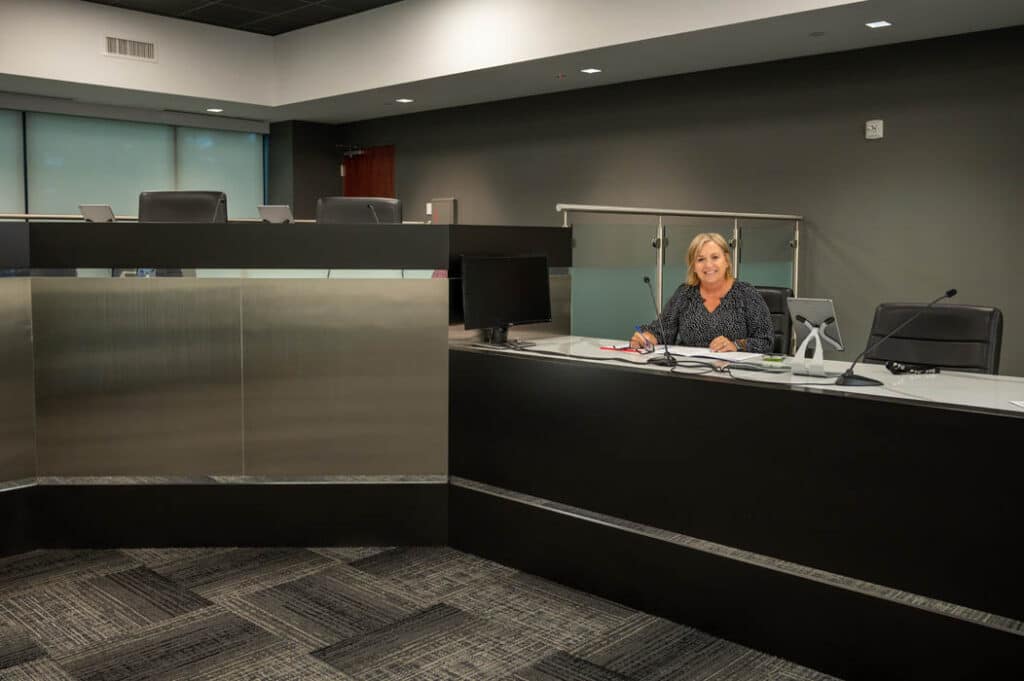
Chereck said she moved over from Alpharetta to begin work on Dec. 12, some six months after the city officially came into being. She was one of a trio of initial official city employees.
“The day I started there was no phone, no furniture, nothing,” she recalled. Because the office lacked outside communications, she gave her personal cell phone number as a route by which officials and citizens could contact her.
“A lot of people still have it because we didn’t get a phone for a couple of weeks, but it’s fine, that’s what I’m here for, to answer questions,” she said.
And the questions come with regularity. At press time, many of them involve getting set up for the Nov. 2 election, in which three city council positions are up for grabs.
“It’s been very interesting,” Chereck said of the training and certification process and her track record of finding people and dealing with setup and logistical issues.
“I wouldn’t say it’s my favorite thing to do,” she added frankly, “because it’s stressful. But it’s very rewarding.”
Chereck said she got interested in government as a youngster while observing her mother’s work with the state department and her dad’s career in a classified military job. At one point, her family lived in Cold War East Germany and she passed armed checkpoints daily to go to school on the west side.
She came to Atlanta to visit a sister and her daughter, “and I wound up staying.” Putting down roots — she’s a 25-year resident of the Corners area — has made her a solid member of the community. That plus being here for a good stretch of time has given her a solid sense of where to send people who need help or have other issues.
That strong orientation toward helping has served her well in city government, she indicated — and did from the outset. “The first couple of weeks we didn’t have anybody to clean or sort the mail or do things that people might think beneath them,” Chereck said. “I made it perfectly clear. Anybody I hired, I told them that cleaning the bathroom was not beneath them, and that I was not going to require it…but that we work as a team.”
She said that with an “amazing” assistant and a supportive city manager, she is a part of the governmental mix for the duration. “They’re going to have to kick me out,” Chereck said.
When she’s not clerking. Chereck says she enjoys boating. swimming, reading and traveling.
Public Works Director- Greg Ramsey
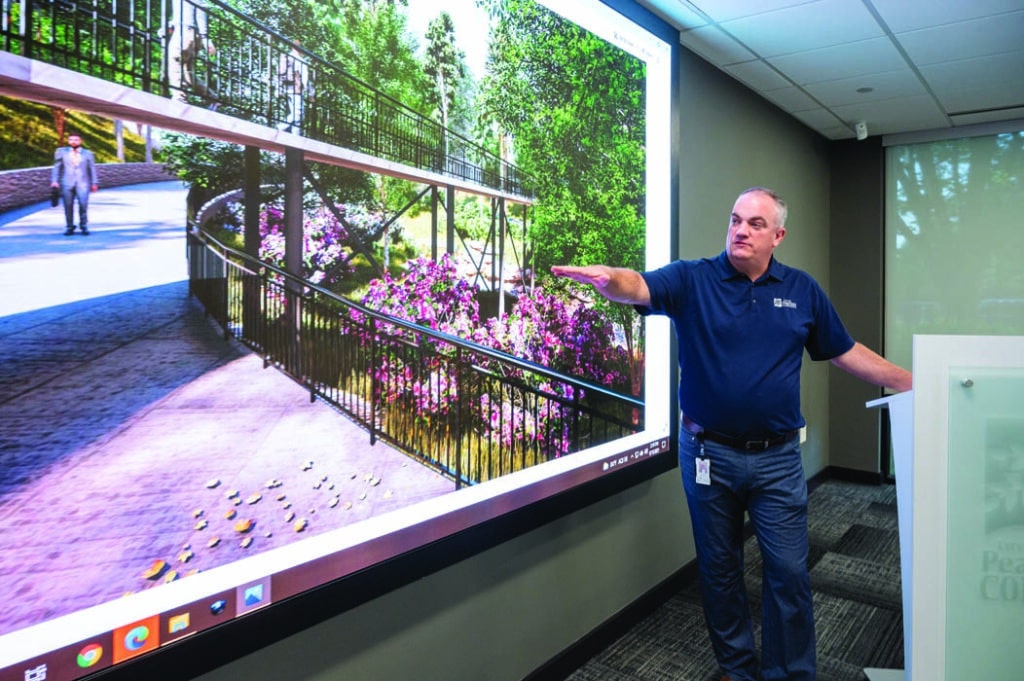
Greg Ramsey has his mind on the gutters, and on the roadways, sidewalks, storm drains and other existing and planned public city infrastructure that falls on his watch.
The Peachtree Corners Public Works Director loves his job keeping the city’s public facilities humming along in good shape — and planning for the future. He loves his job and its variability.
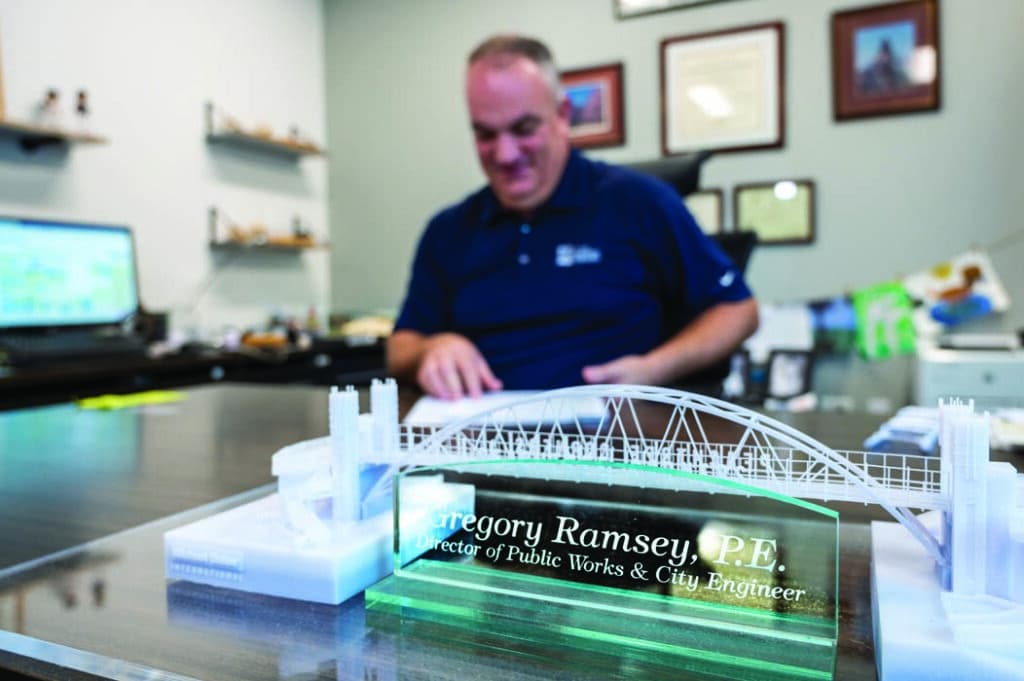
Asked what occupies the bulk of his workday, he replied, “Honestly, that changes from day to day.” Obviously, on a rainy day stormwater is a big issue, making sure the system can handle the runoff, he said, and engineering projects for development is a big consumer of time, as are city “customers” who find problems and report issues.
“It’s spread out pretty evenly and that’s what makes this job interesting,” he stated.
Ramsey came to work for the city in 2014 and was part of the public works operation startup in November of that year, taking over from Gwinnett County. He said one continuing challenge is that Peachtree Corners was mainly built out by the time it incorporated. There is more of a concern with retrofitting and assessment management, which are part of two major linchpins in his job description — project development and infrastructure.
Another challenge that has emerged is residents’ changing taste in public amenities.
Sidewalks are a good example. “They weren’t a priority back in the 70s when a lot of stuff was built. They just built roads,” Ramsey noted. “They didn’t contemplate a future where people would want to walk for pleasure or walk their dogs or walk for transportation.”
Recent years have brought a much greater emphasis on sidewalks and on the trail network the city is now building.
The takeover from Gwinnett involved handling a good bit of road maintenance. “The Gwinnett footprint is so huge that we had the ability to narrow the focus on the smaller geography and, for example, we certainly had some opportunity to expand the sidewalk network,” Ramsey explained.
One of the new and signature projects he’s most proud of is the pedestrian bridge that links the Forum with the Town Center.
Perhaps less high profile, but no less important, are such projects as a stormwater replacement/upgrade that became necessary after a tropical storm washed out a roadway in his first year at the helm. Pipelines and pipeline replacement have also been major undertakings. And the expansion of the trail system is under his umbrella.
Ramsey also looks to the future and the city’s long-range transportation plans. “Traffic is certainly not going to reduce over the coming years,” he noted. That argues for the need for continued traffic improvements. At the same time, he’s proud of what’s been done up to this point to get people out of their cars and make it more feasible for them to bike and walk.
His biggest frustration about the job? “It’s that I can’t please everybody,” he said. It’s a reminder of finite resources pitted against many, many requests.
Ramsey IS pleased to coach his kids’ baseball and softball teams in his time off. He’s also an avid golfer.
Financial Director- Cory Salley
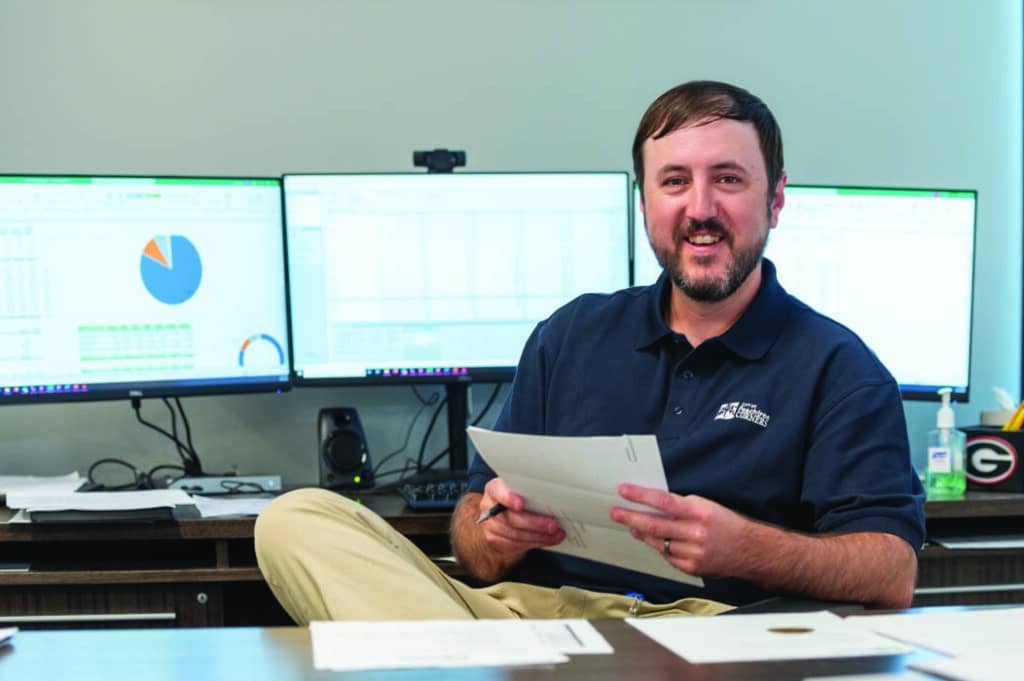
Cory Salley, the city’s financial director, is another of those people who stretch over a broader landscape than is the norm.
Salley arrived in the Corners after stints in Garden City and Anniston, Ala. Johnson brought him to suburban Atlanta.
His suite of responsibilities includes being in charge of the administrative functions of the city budget, accounting, tracking where city money is spent and making sure it’s done appropriately, working with the city’s independent auditors, payroll, business license applications and alcohol permits.
“We pay all the bills and receive all the money that comes to the city as well,” he added.
Most of Peachtree Corner’s income derives from business licenses and franchise fees as the city has no property tax. That may make it a bit more challenging, because the city can’t increase the millage rate like other communities can, but Salley stressed that “even cities with property taxes have to make projections and live within their means like we do.”
And it must be pointed out that having no property tax is a major selling point.
His journey to handling money for Peachtree Corners was a bit circuitous. After getting an undergraduate degree in Economics from the University of Georgia, Salley realized that the field was a broad category, and he wanted to continue to a master’s degree.
A master’s in public administration with a specialization in public finance from the University of Georgia resulted. That, plus tagging along with a relative’s wife who worked for a regional planning commission, piqued his interest in local government.
Like Ramsey, Salley laments having to tell folks no sometimes, but he recognizes its inevitability.
He started with the then 8-year-old city in March of 2020, just in time for the COVID-19 epidemic to roar to life. He helped with the handling and disbursement of federal aid money to businesses.
Riffing off of that rapidly evolving situation, Salley said he’s glad to be working with a young, vibrant city, as opposed to an older city with legacy costs and more bureaucracy. “It allows us to be pretty flexible. If we see a need arise, we’re able to pivot and meet it pretty quickly,” he explained. “This is probably the most responsive government I’ve ever worked for.”
Some late nights become a necessity during budget season. He doesn’t mind coming early and staying later, “although I do have six small kids, so if I stay late, my wife might kill me,” he joked.
When not perched over the metaphorical adding machine, Salley said, he likes to play tennis and hang out with his family.
Related
City Government
Southwest Gwinnett Mayors Share Visions for the Future
Published
4 days agoon
July 22, 2024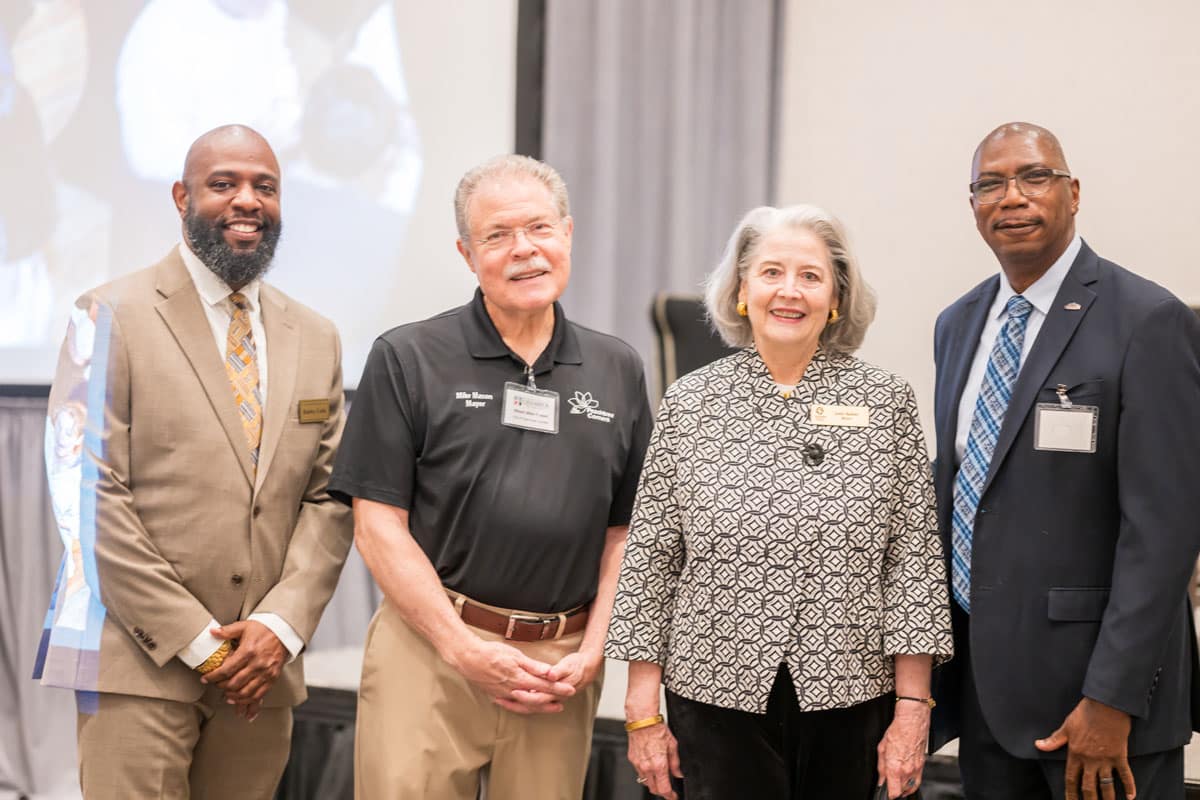
In what has now become tradition, the Southwest Gwinnett Chamber of Commerce hosted mayors from Berkeley Lake, Norcross and Peachtree Corners at a panel discussion on July 12 at the Hilton Atlanta Northeast.
The conversation centered around strategies for revitalizing and expanding metro Atlanta cities, with a focus on redevelopment, zoning ordinance reform, pedestrian and bicycle safety and investing in local schools and affordable housing initiatives.
Zoning changes
“We are beginning a really big project in our city. We have had ordinances that we’ve been working on ever since the city was incorporated in the 1950s,” said Berkeley Lake Mayor Lois Salter.
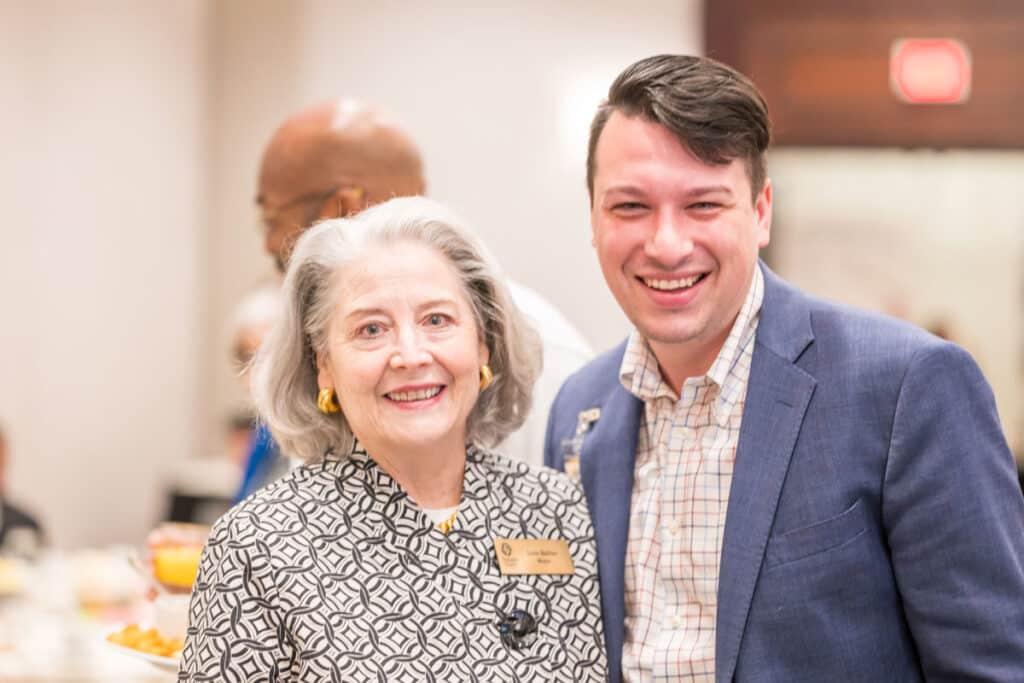
“We feel that we need to overhaul the whole zoning ordinance system and hire a consultant to come and elicit understanding and opinions from our citizens. We want them to be a part of that. We have some folks that resist any kind of regulation. They just want us to regulate their neighbors,” she added.
Norcross Mayor Craig Newton agreed that evolving needs are an important reason to change the zoning, and planning for what lies ahead is paramount. He pointed out that all Georgia cities must implement a comprehensive plan to maintain their qualified local government certifications and remain eligible for selected state funding.
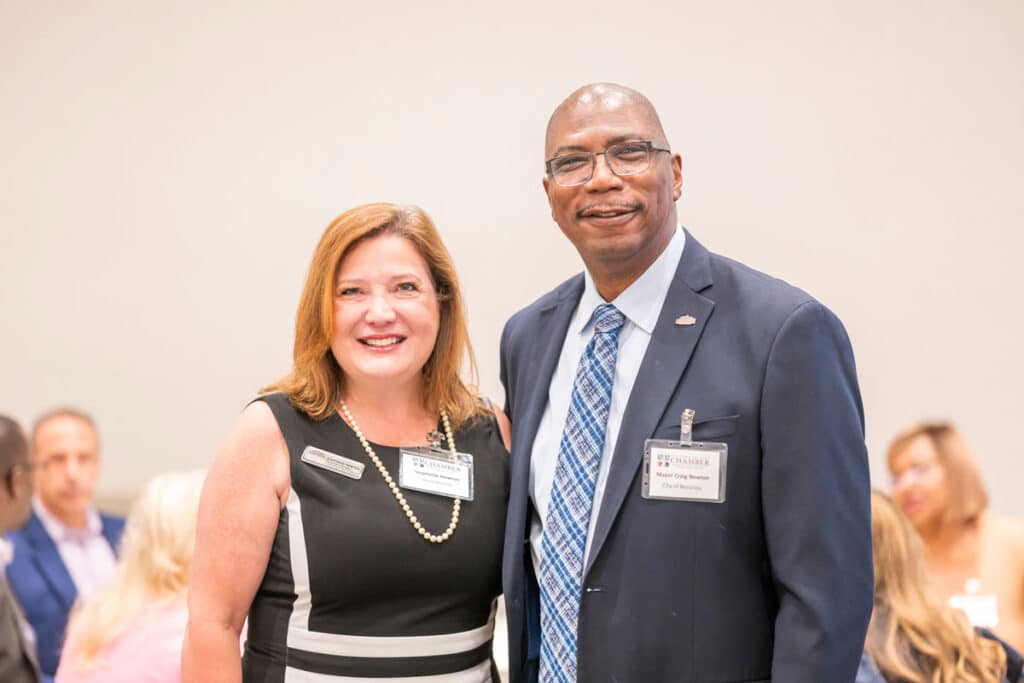
Land development
“We intend to focus on improving pedestrian bicycle safety downtown and establish a sidewalk activity improvement,” he said. “We’re also looking at approving parking in our town center and constructing the Norcross Greenway, which will bring a much-welcomed park, green space and a trail,” he added.
The county announced earlier this year that the project involves redeveloping the existing property into a park that will span almost two acres. It will offer various community spaces, including a multi-use trail, playground, covered picnic area, restroom building and a 41-space parking lot.
In addition to its amenities, a 12-foot-wide concrete trail segment will wind through the park and utility corridor, connecting Singleton Road to Dickens Road.
The trail is part of the 2018 Gwinnett Trails Countywide Trails Master Plan‘s Norcross to Lilburn Trail with an internal loop trail connecting to the neighborhood.
Commercial use
Peachtree Corners has had several “community-friendly” projects come online in the past year, but the effects of the pandemic continue to linger.
“When you think about the future, you’re thinking about the landmass and buildings and commerce. Probably the most significant issue facing a lot of us in the near term is modern office space,” said Peachtree Corners Mayor Mike Mason. “There’s a lot of space. The question is, are people going to come back?”
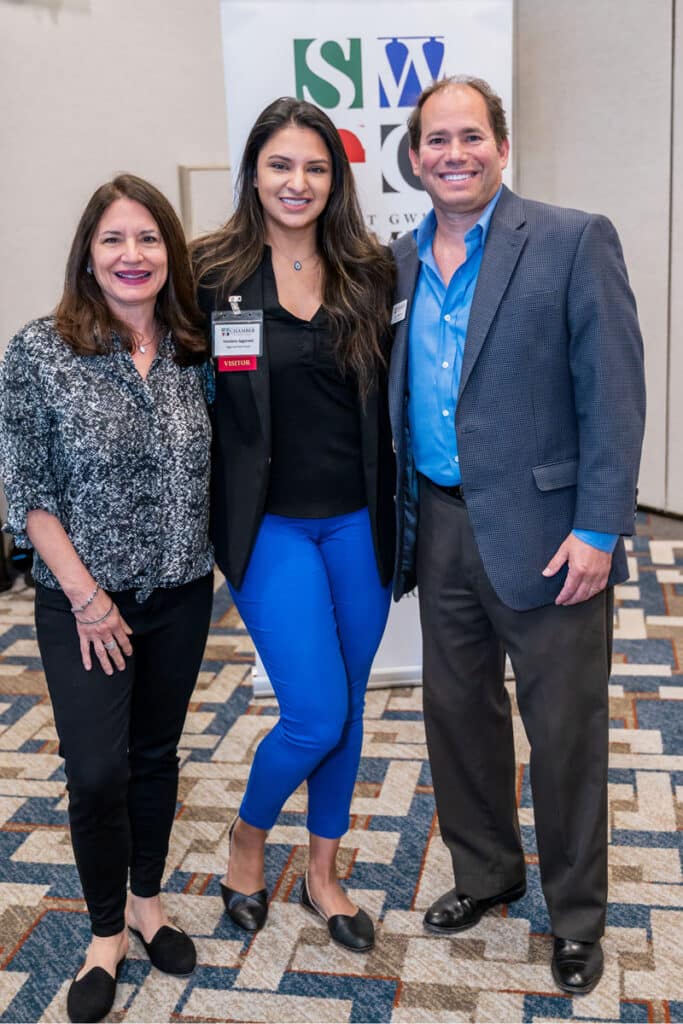

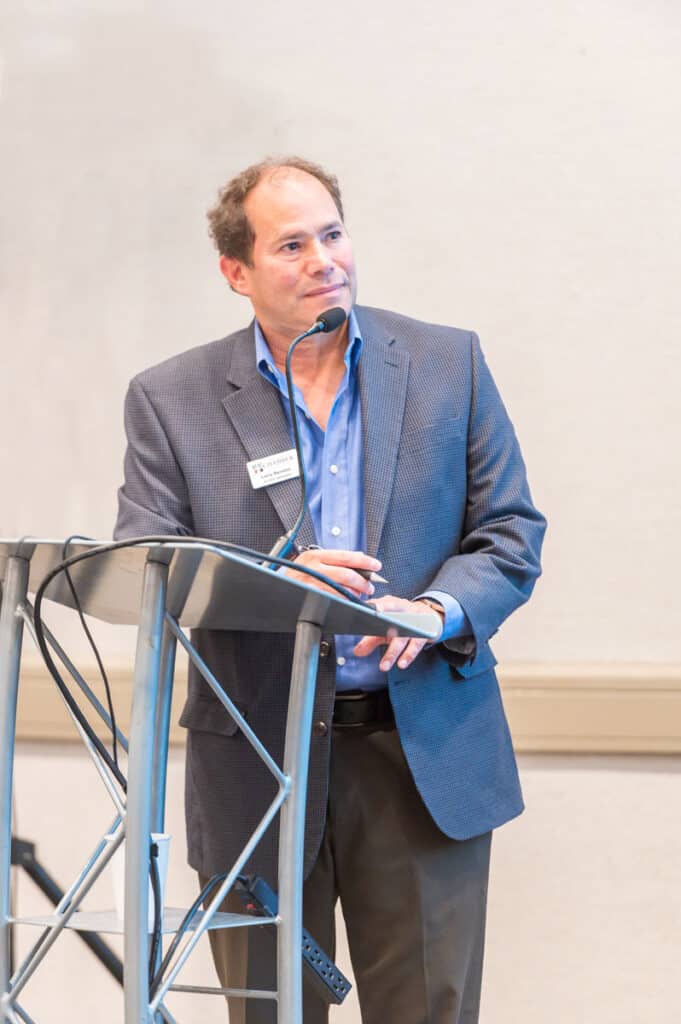
He said that the central retail area has shifted with the revitalization of The Forum and that’s making city leaders rethink city planning.
“We’re having a look at our code and things like that. But from another point of view that will drive the decision about what communities are going to look like,” he said. “For example, there are people coming into the city that say some buildings are technologically obsolete.”
Public safety
Even though Berkeley Lake is the smallest of the three cities and has the highest average home values, all the mayors agreed that public safety is a growing concern.
“Living in Norcross offers residents a dense suburban feel that’s somewhat rural compared to the city of Atlanta,” said Newton. “But some of our public safety initiatives are increasing police presence in high crime areas.”
As the only one of the three cities with a full police department, Norcross is seeking creative ways to implement effective community policing strategies to build trust and communication between law enforcement and the residents.
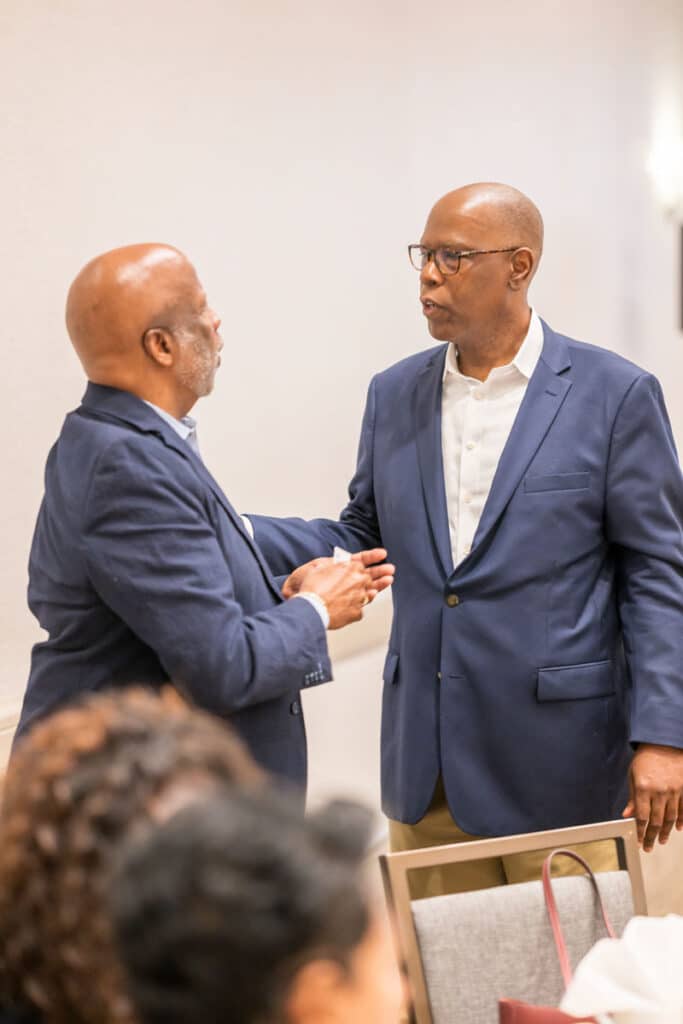
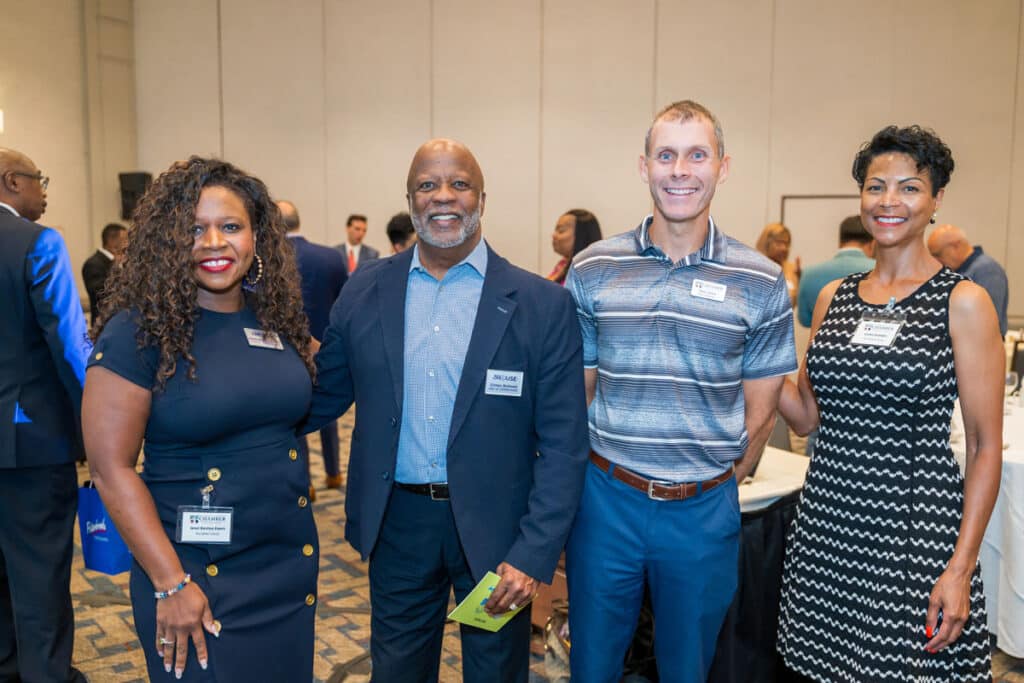
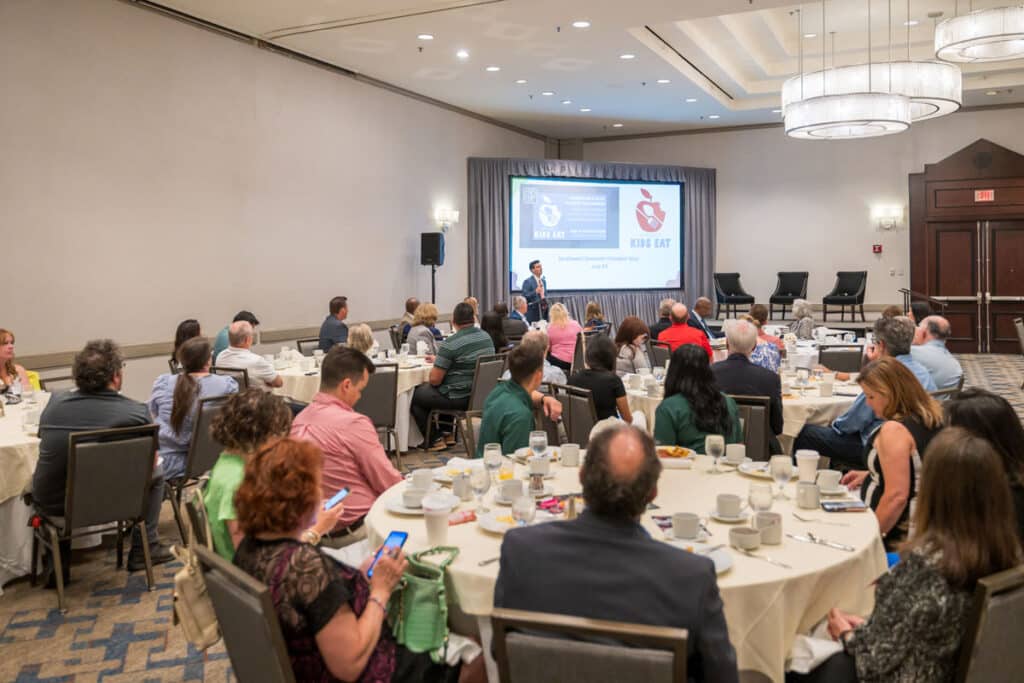
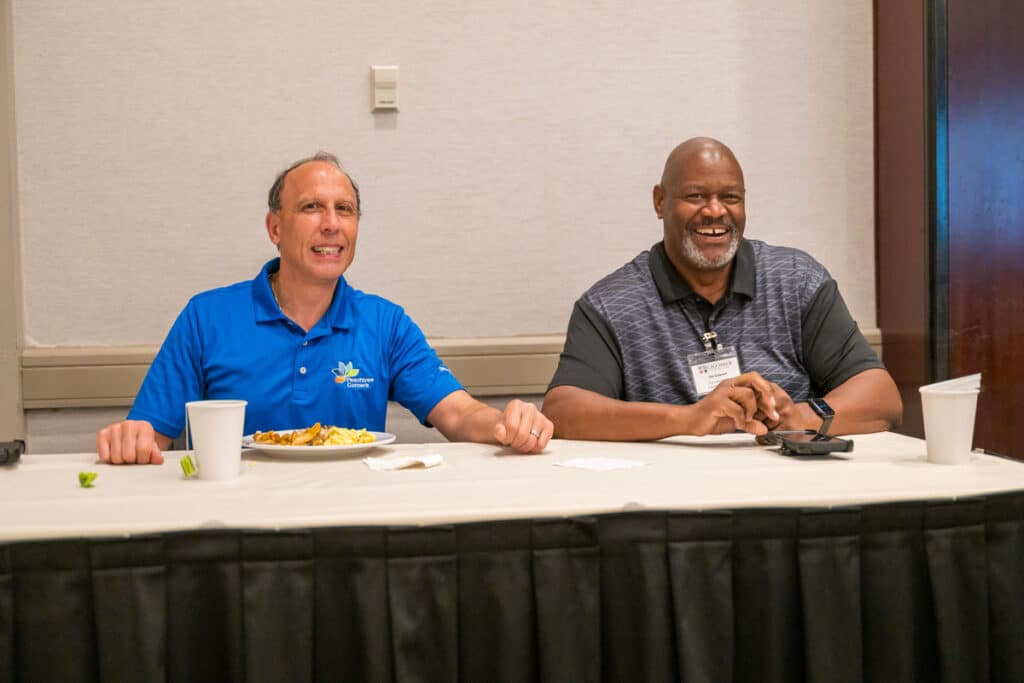
Newton mentioned programs such as Neighborhood Watch, youth outreach programs and educational initiatives along with enhancing emergency response capabilities with training for the local fire department and EMS services.
“Our response time goal is for an officer to be on-site in an emergency within 30 minutes,” he said. “But that doesn’t happen.”
Extended-stay hotels tend to attract crime, so Newton said the city has worked with owners to improve lighting in the public spaces to deter criminal activity.
“We’ve partnered with nonprofit businesses and local stakeholders to support social services employment opportunities for at-risk individuals,” he said. “By working together with various organizations and entities were able to address the complex challenge of public safety.”
Community accountability
With no police force, Berkeley Lake relies heavily on cameras and old-fashioned “knowing your neighbors,” said Salter.
“Some of our individual HOAs are buying and furnishing and paying for cameras to safeguard their neighborhoods,” she said.
Although there may be pockets of criminal behavior around the city, Salter said a police officer once described Berkeley Lake as a “black hole” of crime because there’s so little crime data.
“One of the reasons for that we feel is that historically we’ve been a very neighborly people,” she said. “There is an amazing system of community cohesiveness.”
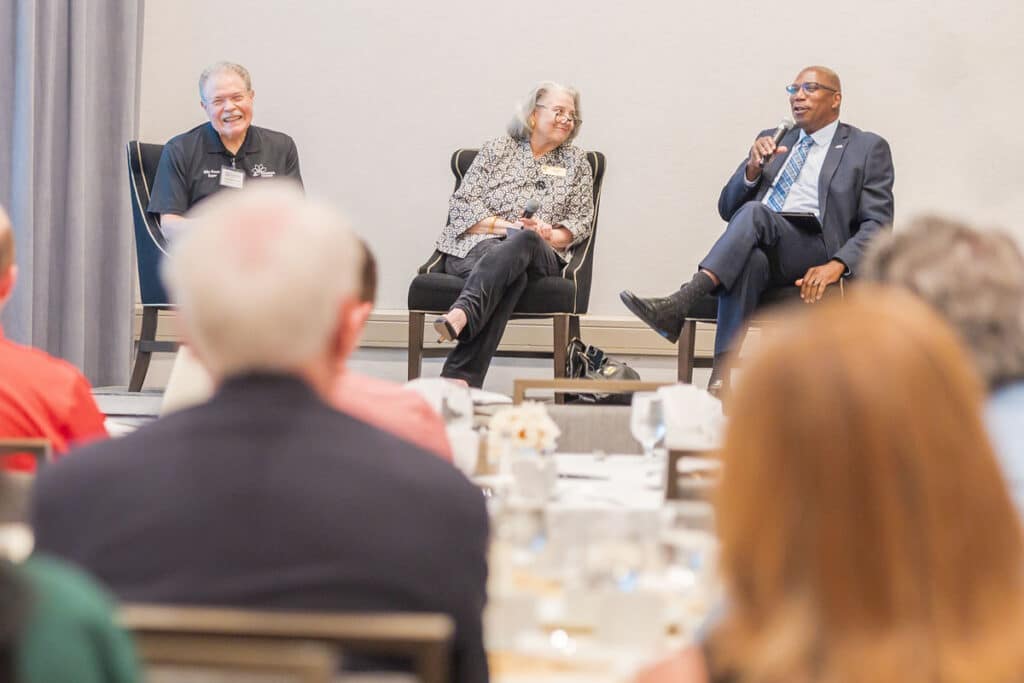
Peachtree Corners is taking its own approach.
“We’ve recently added a Marshal Service and as Lois mentioned we’re also leaning on technology,” said Mason.
The marshal department doesn’t take the place of the services provided by Gwinnett County Police, it primarily enforces city code and aids Gwinnett PD when necessary.
“We’re utilizing as much technology as we can,” said Mason.
Gwinnett PD is instructing where to locate cameras and the city keeps adding them. There have been several instances in the last year or so where coordination among agencies and the use of technology have thwarted or caught criminals.
At the end of the day, the three mayors said the cities all rely on each other. Being so close means that economic development, enhanced entertainment and other desirable amenities are boons for them all.
Related
City Government
Planning and Development is Changing in Peachtree Corners
Published
2 months agoon
June 6, 2024
From Peachtree Corners Mayor Mike Mason’s monthly column.
After the COVID-19 pandemic, the city noticed a development trend that focused on the importance of social interaction. It began seeing development applications for indoor pickleball, virtual racing, garden clubs, car clubs and other recreational uses.
When our city was established in 2012, it adopted Gwinnett County’s codes and ordinances to maintain consistency and these new social interaction-focused uses were not initially considered in the city’s current Comp Plan or zoning code.
Working from home is another market trend having a big impact on local office parks. This economic engine is driven by office parks such as Technology Park and there’s always been a priority placed on preserving office stock.
Even though the commercial office market is waning right now, that pendulum is still trying to figure out where it will settle in. Most of these new socially focused uses find the best home in an office setting.
Due to the increasing number of these applications and the evolving market trends, the city has imposed a six-month moratorium on projects in the Central Business District character area. The moratorium came into effect on May 3 and will end on November 3.
This halt will allow the city six months to pause rezoning applications, special use permits and variances applications for residential or mixed-use development. It will help the city maintain the status quo, stop new applications from coming in and allow for officials to consult with experts and delve deeper into the code and comprehensive plans.
The city plans to conduct extensive research, analysis and strategic planning during this period to help determine if any changes should be made to the comprehensive plan and zoning regulations.
For instance, it might be beneficial to designate downtown as a distinct character area separate from the central business district. Implementing new zoning regulations to transform it into an entertainment district or a unique downtown character area could be a viable option. Many cities have already adopted this type of zoning.
Office parks and businesses throughout the city provide a balance of jobs and residents that allow the city to be the second largest in the state with a zero-millage rate or no city property tax.
Therefore, as part of this process the city will research ways it can preserve, stabilize and enhance the economic engine through the activation of underutilized spaces within office parks.
This proactive approach will help maintain the job-to-resident balance that allows the zero-millage rate while positioning the city for success as the office market pendulum settles.
The most important thing this moratorium does is allow the city to consider what will work best for Peachtree Corners. Furthermore, it communicates to developers that the city requires a pause because current zoning regulations and comprehensive plan do not adequately address future goals.
Related
City Government
Peachtree Corners Welcomes New Community Development Director
Published
2 months agoon
June 2, 2024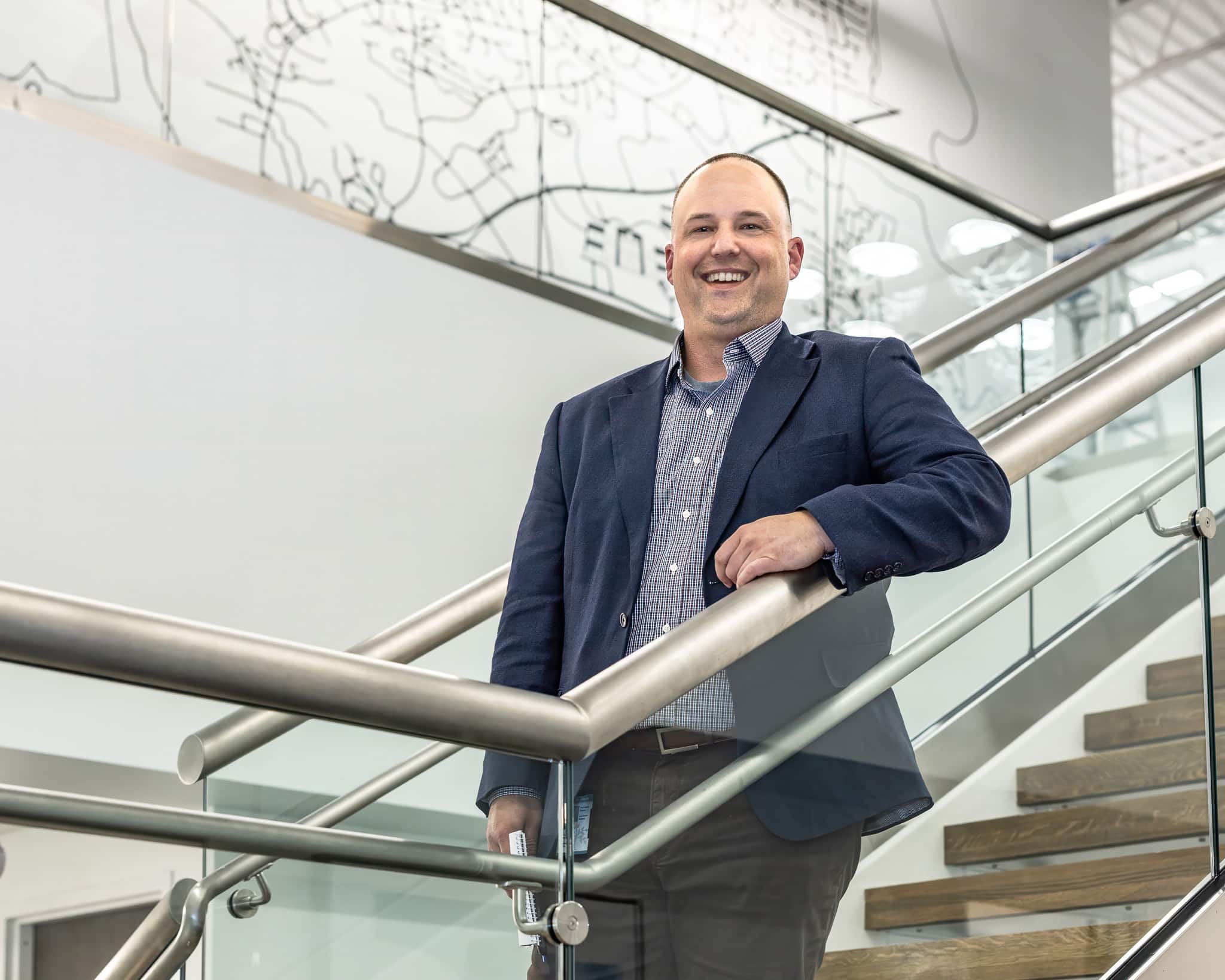
With community development director Diana Wheeler stepping down to pursue a consulting career, Peachtree Corners city leadership turned a challenge into an opportunity.
In January, Shaun Adams was hired as the assistant city attorney to oversee compliance for land use and economic development-related matters and help with legal issues.
His background in public and private sector development made him the ideal replacement.
As luck would have it, Adams moved to Georgia in 2005, selling real estate while attending law school.
“I actually started working down at the capital a lot, lobbying on various policies right out of law school,” he said. “I was the legal counsel for the Senate Judiciary, and that exposed me to ACCG, which is the State County Association, which represents all staff and elected officials for counties across the state.”
With the motto, Advancing Georgia’s Counties, ACCG helps with the policy aspect of things like training and education.
“While I was a lobbyist for them, I focused on economic development, infrastructure-related issues and whatever policies went into place,” Adams said. “We also went around the state and trained our commissioners and their staff on some of those policies and put their new processes in place.”
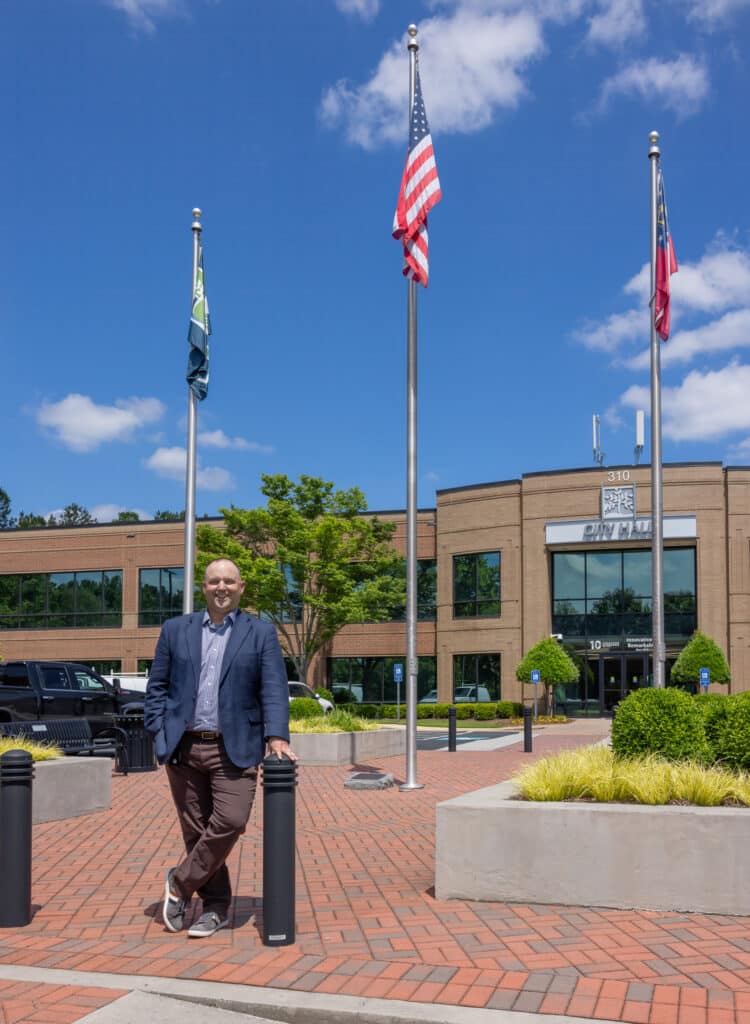
Local government possibilities
“After a handful of years, I got lured away into the private sector,” he said.
Working on land use and government relations matters from the other side of the table, Adams represented developers and investors.
“Sometimes [investors would] come to me with a property that they bought, and they’d say, ‘Hey, we bought this on investment. We’d like to see how we can make the highest and best use of it. Help us create a vision,’” he said. “So, I helped put a team together to determine what we thought could go on the site based off of local government zoning.”
His job entailed working with architects and engineers to design the site and help the client take it to market. Ultimately, the contract purchaser would come in and seek needed entitlements.
“I would help with that,” Adams said. “Those were the fun ones because you got to start on the ground.”
Adams got to know many different local government jurisdictions and worked extensively around metro Atlanta on various matters. On a busy week, he may work with five different jurisdictions across the state.
As a family man with a wife and two sons, he began looking for something that would keep him closer to home.
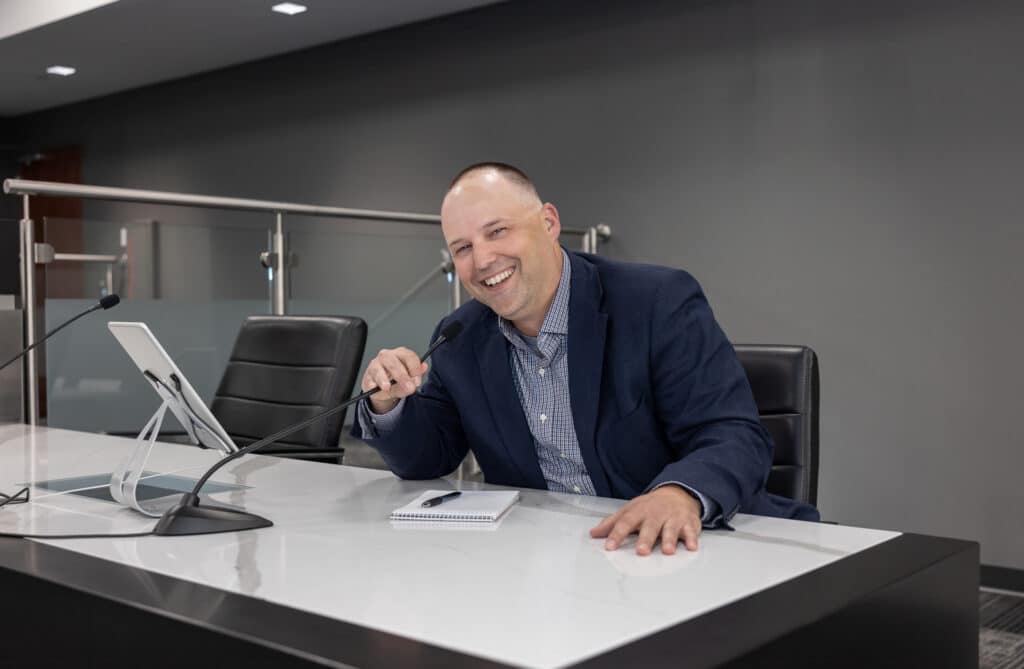
A perfect fit
City Manager Brian Johnson says it was serendipitous that Adams was looking for a position at a time when the city needed someone like him.
“It’s actually a hard position to fill, and I just happened to catch him,” said Johnson. “We were familiar with each other because he’s represented a number of clients coming before the city.”
Johnson said that Adams was legal counsel for some of the most significant developments in the last few years: North American Properties purchasing and revitalizing The Forum, housing development Waterside, and Intuitive Surgical moving its headquarters from the West Coast.
“He was on the other side of the table as we worked together to make these projects ultimately better for the city and better than they were upon their initial submittal,” Johnson said.
“And I knew then that he was a really knowledgeable guy that really knows how to deal with people. He’s a problem solver. He’s always looking for ways to figure out how to resolve conflict and navigate minefields as it relates to land use and all the laws and zoning that apply to it,” he added.
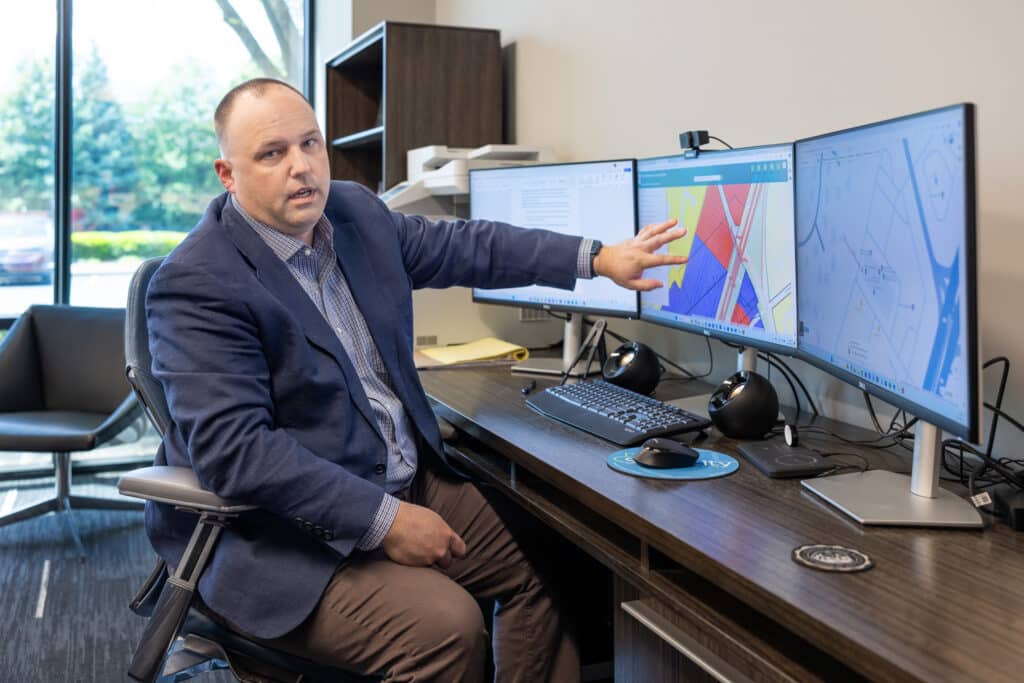
Changes to the job
Although Wheeler is no longer a staffer, she’s still doing work for the city.
With Adams’ legal background, the events planning team will be transitioning out from under community development.
“By taking that off my plate, it’ll allow me to do more with the legal side of things that the position didn’t do previously,” he said.
There will also be a shift with code enforcement duties moving under Chief Marshal Edward Restrepo.
“I moved code enforcement underneath the city marshal’s office because code enforcement and law enforcement are almost like fraternal twins — they both do very similar things,” said Johnson. “Each of them is enforcing a different level of law. Code enforcement is municipal code, and law enforcement is state code, but they work hand in hand.”
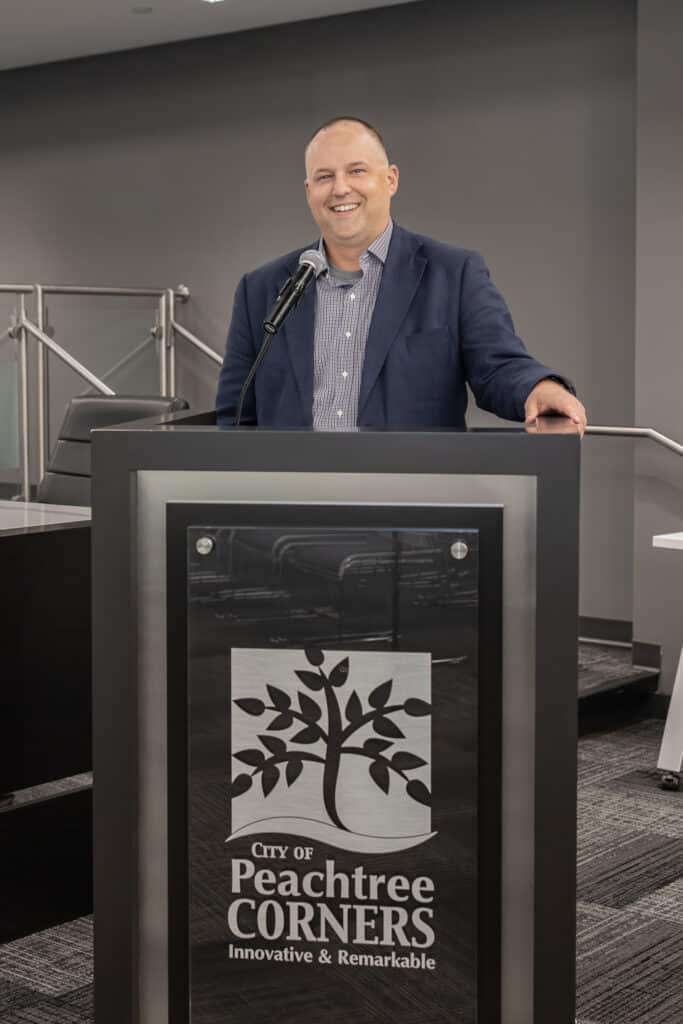
The events planning through the end of the year has already been moved from the community development director’s department. As a consultant, Wheeler will work with other contractors to manage the happenings at the Town Center. Director of Communications Louis Svehla has already moved into managing premier events, Johnson said adding that the city may use more consultants in the future under Svehla’s management.
“He has really shown his ability to manage special events very adeptly. He really showed me that skill set when we had last year’s Criterium bike race,” said Johnson. “I decided to take advantage of some opportunities, including our partnership with Audi, which we were going to announce to the whole vulnerable road user thing.”
With only three months to prepare, Svehla pulled off the event without a hitch.
“He did an outstanding job and so he is capable of taking the management of our community events, our concerts and stuff,” said Johnson.
Johnson said the city is still utilizing consultants for some aspects of special events, but if consultant fees become more expensive than hiring someone full-time to assist Svehla, he’ll make that call.
“All those moves have happened, and I’ll sum it up by just saying that I’m just playing to the strengths of these people and utilizing a great team that I have, and it’s working out really well,” Johnson said.
Related
Read the Digital Edition
Subscribe
Keep Up With Peachtree Corners News
Join our mailing list to receive the latest news and updates from our team.
You have Successfully Subscribed!

Taste of Peachtree Corners: PCBA Showcases Local Restaurants

What’s going on at Jones Bridge Park and the Challenges of Urban Development

The Forum Gives Sneak Peek of New Eateries and Community Spaces

Southwest Gwinnett Mayors Share Visions for the Future

Peachtree Corners Shines Bright with Light Up the Corners Glow Race this August

8 Events Happening In and Around Peachtree Corners This August

Peachtree Corners Shines Bright with Light Up the Corners Glow Race this August

The Forum Gives Sneak Peek of New Eateries and Community Spaces

8 Events Happening In and Around Peachtree Corners This August

Southwest Gwinnett Mayors Share Visions for the Future

Taste of Peachtree Corners: PCBA Showcases Local Restaurants

What’s going on at Jones Bridge Park and the Challenges of Urban Development

Local Resident Opens AtWork Location in Peachtree Corners

CHRIS 180 Expands its Services into Gwinnett County [Podcast]

Light up the Corners [Video]

Capitalist Sage: Business Leadership in Your Community [Podcast]

Cliff Bramble: A Culinary Adventure through Italy

Top 10 Brunch Places in Gwinnett County

A Hunger for Hospitality

THE CORNERS EPISODE 3 – BLAXICAN PART 1

Top 10 Indoor Things To Do This Winter

The ED Hour: What it takes to Remove Barriers from Education
Peachtree Corners Life
Topics and Categories
Trending
-
Business1 week ago
Taste of Peachtree Corners: PCBA Showcases Local Restaurants
-
Business2 days ago
The Forum Gives Sneak Peek of New Eateries and Community Spaces
-
City Government4 days ago
Southwest Gwinnett Mayors Share Visions for the Future
-
Community2 days ago
Peachtree Corners Shines Bright with Light Up the Corners Glow Race this August







